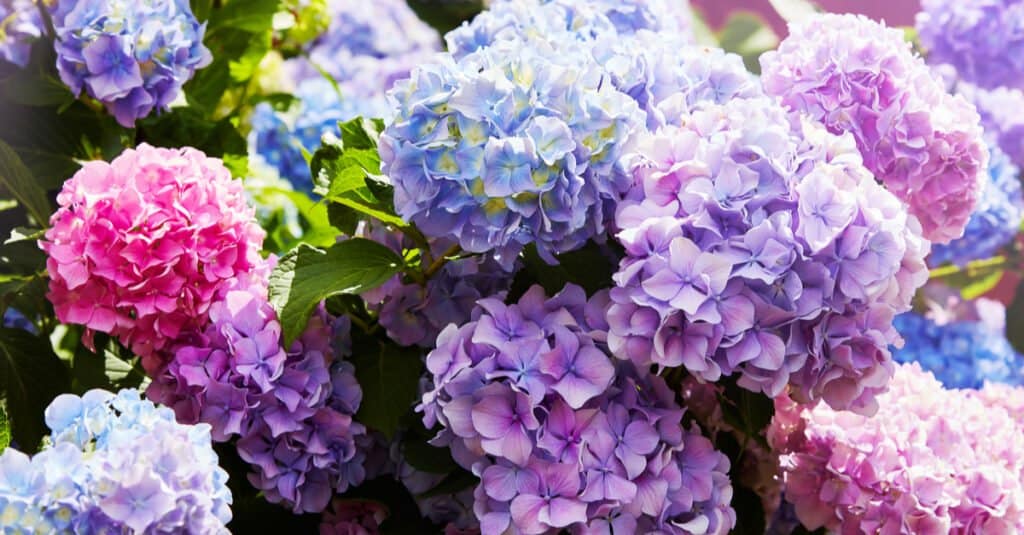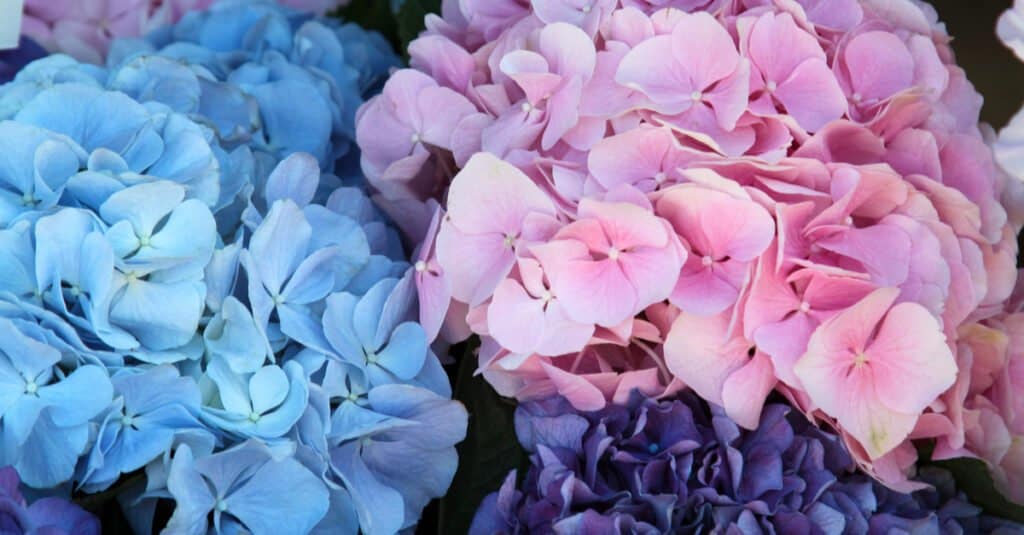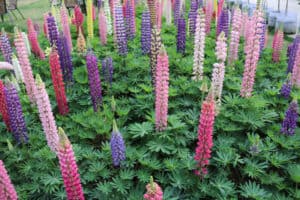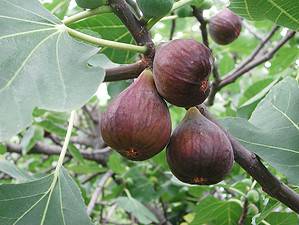
©unverdorben jr/Shutterstock.com
Hydrangeas are a large genus with over 75 species and 600 cultivars native to the Americas, Asia, Japan, and the Himalayas. This plant’s lovely blossoms are what make it so popular. It’s suitable for light shade to full sun. Its huge flowers come in several shapes and sizes, and its blossoms come in a rainbow of colors! The plants can grow from 1 foot to 100 feet as a climbing vine! However, while hydrangeas are undeniably lovely, they are poisonous to dogs and cats. To learn more about how poisonous hydrangeas are to both dogs and cats, keep reading.
Are Hydrangeas Poisonous to Dogs or Cats?

Enough consumption of hydrangeas causes diarrhea and vomiting.
©krolya25/Shutterstock.com
Hydrangeas are poisonous to cats and dogs, although it takes a lot for them to get sick. Many cases go unreported because of minimal symptoms. Generally, consuming enough leaves, flowers, or buds causes diarrhea and vomiting. Lethargy, despair, and bewilderment can also happen to some pets.
The hydrangea’s leaves, flowers, and buds contain amygdalin, a cyanogenic glycoside. Amygdalin is not harmful in its natural state, but when digested by humans, dogs, or cats, it creates cyanide, which is toxic. Amygdalin is found in all parts of the hydrangea plant, although the largest amounts are in the flowers and young leaves.
Toxic poisoning symptoms in pets require a particular level of plant consumption. Smaller pets are more prone to poisoning since they need to eat less to get sick.
What Are the Symptoms of Hydrangea Poisoning in Pets?
Any component of the hydrangea plant can poison dogs and cats. Symptoms of hydrangea poisoning in cats include:
- Appetite loss
- Vomiting
- Diarrhea
- Abdominal pain
- Depression
What To Do If Your Pet Has Consumed Hydrangeas?
If your dog or cat has eaten any portion of hydrangea blooms, you should seek immediate medical attention and monitor your pet for signs of discomfort. If your dog or cat remains unwell from the plant poison, fluids, medicines, and/or pain medication may be required for recovery. Additionally, a bland meal such as boiled chicken, white rice, or plain yogurt may be necessary for your pet as it recovers from the side effects. Fortunately, hydrangea poisoning is rarely lethal unless proper precautions are ignored.
How To Prevent Hydrangea Poisoning in Pets

Keep hydrangeas away from your pets.
©Anna-Nas/Shutterstock.com
If your dog or cat likes to peruse the hydrangeas in your yard, you should take steps to keep them away as much as possible. Scattering shells, branches, and thorny vines around the hydrangea area can discourage pets from stepping on them. There are a few additional options available to you as well.
Non-Toxic Oil Sprays
To keep your garden or plants safe from pesticides, you can use a non-toxic botanical oil spray. For dogs and cats, the unpleasant scent of plant oils is a deterrent.
Motion Sprinkler System
To keep animals out of your garden, consider installing a motion-activated sprinkler system around the perimeter. When motion is detected by the sprinkler, it will spray the intruder in that direction.
Sound and Light Deterrents
Movement can also be detected using ultrasonic deterrents. Pets might be scared away from certain sections of the yard or garden by the use of an ultrasonic sound or a bright light.
Bottom Line
If you have a dog or cat that likes to eat flowers and leaves, you should take extra measures when cultivating hydrangeas, regardless of the strategy you use.
If you have any concerns about your pet’s health, you should never hesitate to call your veterinarian.
The photo featured at the top of this post is © Anna-Nas/Shutterstock.com
Thank you for reading! Have some feedback for us? Contact the AZ Animals editorial team.






